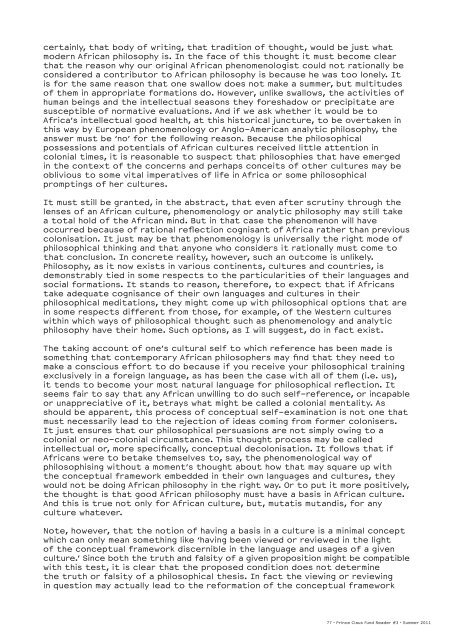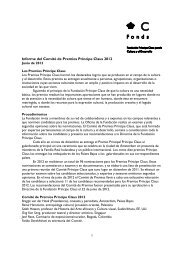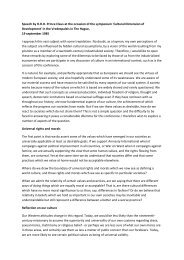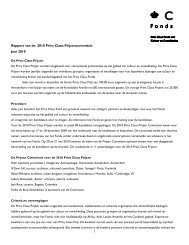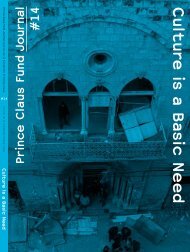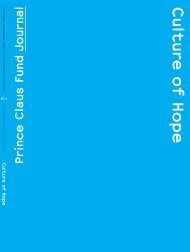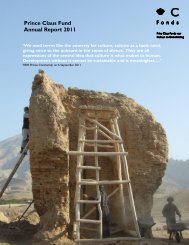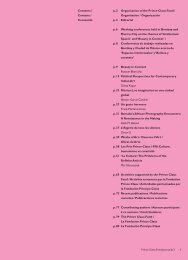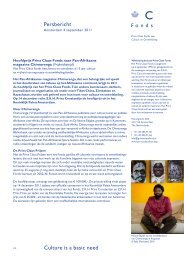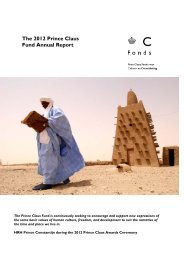3 summer 2011 - Prince Claus Fund
3 summer 2011 - Prince Claus Fund
3 summer 2011 - Prince Claus Fund
- No tags were found...
You also want an ePaper? Increase the reach of your titles
YUMPU automatically turns print PDFs into web optimized ePapers that Google loves.
certainly, that body of writing, that tradition of thought, would be just whatmodern African philosophy is. In the face of this thought it must become clearthat the reason why our original African phenomenologist could not rationally beconsidered a contributor to African philosophy is because he was too lonely. Itis for the same reason that one swallow does not make a <strong>summer</strong>, but multitudesof them in appropriate formations do. However, unlike swallows, the activities ofhuman beings and the intellectual seasons they foreshadow or precipitate aresusceptible of normative evaluations. And if we ask whether it would be toAfrica’s intellectual good health, at this historical juncture, to be overtaken inthis way by European phenomenology or Anglo-American analytic philosophy, theanswer must be ‘no’ for the following reason. Because the philosophicalpossessions and potentials of African cultures received little attention incolonial times, it is reasonable to suspect that philosophies that have emergedin the context of the concerns and perhaps conceits of other cultures may beoblivious to some vital imperatives of life in Africa or some philosophicalpromptings of her cultures.It must still be granted, in the abstract, that even after scrutiny through thelenses of an African culture, phenomenology or analytic philosophy may still takea total hold of the African mind. But in that case the phenomenon will haveoccurred because of rational reflection cognisant of Africa rather than previouscolonisation. It just may be that phenomenology is universally the right mode ofphilosophical thinking and that anyone who considers it rationally must come tothat conclusion. In concrete reality, however, such an outcome is unlikely.Philosophy, as it now exists in various continents, cultures and countries, isdemonstrably tied in some respects to the particularities of their languages andsocial formations. It stands to reason, therefore, to expect that if Africanstake adequate cognisance of their own languages and cultures in theirphilosophical meditations, they might come up with philosophical options that arein some respects different from those, for example, of the Western cultureswithin which ways of philosophical thought such as phenomenology and analyticphilosophy have their home. Such options, as I will suggest, do in fact exist.The taking account of one’s cultural self to which reference has been made issomething that contemporary African philosophers may find that they need tomake a conscious effort to do because if you receive your philosophical trainingexclusively in a foreign language, as has been the case with all of them (i.e. us),it tends to become your most natural language for philosophical reflection. Itseems fair to say that any African unwilling to do such self-reference, or incapableor unappreciative of it, betrays what might be called a colonial mentality. Asshould be apparent, this process of conceptual self-examination is not one thatmust necessarily lead to the rejection of ideas coming from former colonisers.It just ensures that our philosophical persuasions are not simply owing to acolonial or neo-colonial circumstance. This thought process may be calledintellectual or, more specifically, conceptual decolonisation. It follows that ifAfricans were to betake themselves to, say, the phenomenological way ofphilosophising without a moment’s thought about how that may square up withthe conceptual framework embedded in their own languages and cultures, theywould not be doing African philosophy in the right way. Or to put it more positively,the thought is that good African philosophy must have a basis in African culture.And this is true not only for African culture, but, mutatis mutandis, for anyculture whatever.Note, however, that the notion of having a basis in a culture is a minimal conceptwhich can only mean something like ‘having been viewed or reviewed in the lightof the conceptual framework discernible in the language and usages of a givenculture.’ Since both the truth and falsity of a given proposition might be compatiblewith this test, it is clear that the proposed condition does not determinethe truth or falsity of a philosophical thesis. In fact the viewing or reviewingin question may actually lead to the reformation of the conceptual framework77 · <strong>Prince</strong> <strong>Claus</strong> <strong>Fund</strong> Reader #3 · Summer <strong>2011</strong>


